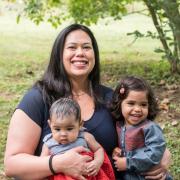More Than Support. How We Can Strengthen Families In Times of Distress
There is a lot of lip service paid to the concept of family friendly policies. Other times the word family is avoided all together, in favor of terms like two-generation programming, so as to avoid the nuances of what family means. However, whether you say it or don't say it, according to data compiled by the Pew Research Center, the U.S. ranks last in every measure of family-friendly policies from government-supported leave to flexible work scheduling. Yet, strong communities, and strong societies are built on strong families. And families in all their shapes and forms need to be supported through policy and practice. Cracks in our federal policies supporting families and communities become cavernous gaps during times of disaster and unexpected duress. Far too many families fall into the gap. If families need support to deal with critical life events such as a birth or an ill parent, how much more do they need support during periods of extreme stress?
At those times, the action required goes beyond resource support to broad-based family strengthening. We must do more than prop families up, we must make them stronger and more resilient afterwards. More than a band-aid fix, we need a holistic approach that considers all the ways that families exist and seeks to make them stronger for longer thereafter. This is bigger than just being a good human, this is also good health. Chronic stress can take a toll on our minds and bodies. Studies show there are serious physical implications—- stress promotes inflammation, can impair your antibody response, slows wound healing, and suppresses cell-mediated immune function. For children, early trauma can have long lasting impacts on not only their physical and mental health but on their ability to learn. Strong families are key to building community resiliency. Research demonstrates that social relationships, both formal and informal, are mediators of psychosocial stress.
As the recovery from the recent disasters continues, particularly the unacceptably slow recovery in Puerto Rico where as of February 11th, almost six months after Hurricane Maria, 25% (over 450,000 residents) of the island still does not have access to electricity. Even in locations where electricity has been restored, outages and blackouts are still common. The ongoing power outage on the island has been named the “largest blackout in American history.” According to Puerto Rico officials, rural areas continue to have trouble securing clean water and food. Many communities are still under a “boil water” advisory.
The commitment to strengthen, not just support, families must remain steadfast. That means not just providing additional physical resources but tapping into a community’s natural capacities, such as its resilience and social network to promote healing. Resilient communities built on family and community strengthening principles offer opportunities to improve the health and wellbeing of its members.
To that end, Urban Strategies has developed the Family Friendly Spaces model to build on an individual, family and community’s natural and evolving coping capacities. The Family Friendly Spaces model recognizes the collective nature of Latino community and builds local community capacity to support each other. The model, built on several internationally recognized programs, coupled with Urban Strategies’ experience and knowledge of the Latino community and its own unique family strengthening methodology, consist of five key components, designed to reduce the range of distressing effects of a crisis on parents, children and caregivers in a community support setting. This approach acknowledges the inherent strength of families and community networks and leverages those with wrap around services that support families and the networks that families depend on. It is a response to not only an emergency and crisis but to a broken system that often lacks family centered programming and policy.
The need for Family Friendly Spaces goes beyond the immediate trauma of the hurricanes and the need for family centered support is critical as communities rebuild and continue to find themselves marginalized. In Houston, TX for instance the trauma of Hurricane Harvey is now exacerbated by attacks on mixed status families by ICE officials making children and their families feel unsafe. In Puerto Rico, the slow recovery has re-traumatized children and families as they wait for support. Family Friendly Spaces as safe spaces for families to come together to process trauma, find resources and begin to recover.
At the core of the Family Friendly Spaces are child-focused environments where children can continue their cognitive and emotional development and participate in activities including play (which is key to how children express and process emotion) that minimizes any disruption to normalcy and helps establish a sense of security and continuity for the child. Basic human needs include making meaning and belonging, yet trauma often results in individuals trying to put pieces back together alone.
Urban Strategies first Family Friendly Spaces have been piloted in Patillas and Utuado, Puerto Rico and will wrap- up their first round of services in the next few weeks with additional spaces slated to open in other areas of need.
We implore all those that care about marginalized communities to consider this family wellness approach that goes beyond support to sustained families and community strengthening.
Juntos Podemos!
For more information about Family Friendly Spaces contact Cristina Diaz Hernandez at cdiaz@urbanstrategies.us


The views and opinions expressed in this post are those of the author(s) and do not necessarily reflect those of MomsRising.org.
MomsRising.org strongly encourages our readers to post comments in response to blog posts. We value diversity of opinions and perspectives. Our goals for this space are to be educational, thought-provoking, and respectful. So we actively moderate comments and we reserve the right to edit or remove comments that undermine these goals. Thanks!